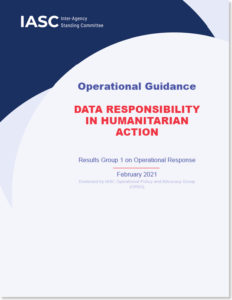 “Data responsibility in humanitarian action is the safe, ethical and effective management of personal and non-personal data for operational response. It is a critical issue for the humanitarian system to address and the stakes are high. Ensuring we ‘do no harm’ while maximizing the benefits of data requires collective action that extends across all levels of the humanitarian system. Humanitarians must be careful when handling data to avoid placing already vulnerable individuals and communities at further risk. This is especially important in contexts where the urgency of humanitarian needs drives pressure for fast, sometimes untested, data solutions, and the politicization of data can have more extreme consequences for people.
“Data responsibility in humanitarian action is the safe, ethical and effective management of personal and non-personal data for operational response. It is a critical issue for the humanitarian system to address and the stakes are high. Ensuring we ‘do no harm’ while maximizing the benefits of data requires collective action that extends across all levels of the humanitarian system. Humanitarians must be careful when handling data to avoid placing already vulnerable individuals and communities at further risk. This is especially important in contexts where the urgency of humanitarian needs drives pressure for fast, sometimes untested, data solutions, and the politicization of data can have more extreme consequences for people.
“The implementation of data responsibility in practice is often inconsistent within and across
humanitarian response contexts. […] While each organization is responsible for its own data, humanitarians under the Inter-Agency Standing Committee (IASC) need common normative, system-wide guidance to inform individual and collective action and to uphold a high standard for data responsibility in different operating environments. In view of this, the IASC Results Group 1 established a Sub-Group on Data Responsibility in January 2020 to develop this joint, system-wide Operational Guidance on Data Responsibility in Humanitarian Action.”
Co-led by the International Organization for Migration (IOM), the OCHA Centre for Humanitarian Data, and the UN Refugee Agency (UNHCR), the Sub-Group comprised 20 member organizations representing different stakeholders within the humanitarian system. As a member, JIPS specifically contributed to its priority areas on supporting efforts to operationalize localization and this guidance. Given the dynamic and evolving nature of the challenges and opportunities for data responsibility in humanitarian action, this Operational Guidance will be reviewed and updated through a collaborative and consultative process every two years.